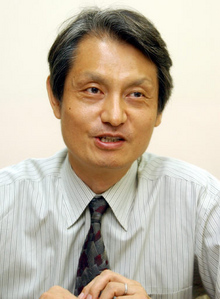Posted on : Nov.18,2006 20:35 KST
Modified on : Nov.20,2006 13:42 KST
Lee Jong-won, Professor of International Politics, Rikkyo University
There continues to be a lot of questions about whether Japan should possess nuclear capabilities. The first embers were lit by Nakagawa Shoichi, chairman of the Policy Research Council of Shinzo Abe’s Liberal Democratic Party (LDP). Shoichi later backpedaled a bit, saying that "for strategic reasons" he would not make any further suggestions about Japan acquiring nukes.
On November 7, however, LDP official Takashi Sasakawa dived deep into controversy by saying Japan’s "three principles of non-nuclearization" need to be revised. The Japanese media are filled with arguments for and against having nuclear weapons. You might say Nakagawa was successful in his intent, as discussion of whether or not to possess nuclear arms has been politically "liberalized."
Prime minister Shinzo Abe, in part, maintains the position that the "three principles" need to be maintained, but he also refuses to keep members of his cabinet from publicly joining in the discussion. There was a time, before he became prime minister, that he was in favor of having the bomb, and called for a revision of the three principles. Even if we say that it was North Korea’s test of a nuclear device that set the change in motion, even before Abe’s government was formally sworn in, influential members of his cabinet and ruling party began bringing up the issue publicly all at once, and Abe allowed this to happen. Whether that turns out to have been an omen of all-out policy changes to come remains to be seen.
According to an Asahi Shimbun report dated November 12, even back in 1995 the Japanese government considered the advantages of having nuclear weapons. At the time, it concluded that moving ahead with nukes would weaken the U.S.-Japan alliance and hurt relations with neighboring nations, and that continued reliance on the U.S. "nuclear umbrella" was the "best choice" under the situation at the time. It was in 1995 that it was decided the Nuclear Non-proliferation Treaty (NPT) was to be extended indefinitely, and the Japanese decision not to develop nuclear capabilities came shortly after the "first" North Korean nuclear crisis in the early ’90s. It is possible there will be an internal Japanese government review of its policy now that Pyongyang has tested its own bomb. Public statements about the issue by key members of the Abe administration might be an expression of dissatisfaction with Japan’s current policy position.
A common thread of the claims coming from people close to the Abe administration is a sense of anxiety about the U.S. "nuclear umbrella." America’s pledge of protection under its nuclear umbrella came back in the Cold War, a time when the two countries were in full confrontation with China and the USSR, and as such the nuclear umbrella was a structured entity and meant to be almost automatic. Now, the relationships of confrontation are diverse and localized with all the usual post-Cold War fluidity, so some have doubts about how definite a pledge the U.S. is making. It’s called the "U.S.-Japan alliance," but there are formative conflicts of interest between the U.S. and Japan, and with the U.S. placing the highest priority on the Middle East, it is possible the U.S. might not get involved in a "local" conflict even if, for example, there was a sharp confrontation between Japan and North Korea. Nothing is for certain. After all, in the second Bush administration you have seen the pursuit of "strategic cooperation" between Washington and Beijing, alongside the simultaneous potential for a confrontation between the two.
U.S. secretary of state Condoleezza Rice went to Japan right after the most recent round of discussion on the issue broke out. She said the U.S. would use the "full range" of its power to defend Japan. She repeated herself and said out loud that she wanted to emphasize as much. She went out of her way to let people know the U.S. would respond to an attack no matter what. Her comments were a demonstration of what discussions look like between the two countries.
There are major changes underway in the realm of geopolitical dynamics and security guarantees in Northeast Asia. The situation is such that, as evidenced by the reaction to the North Korean nuclear situation, there exists the possibility that uneasiness could lead to an urge to acquire or develop nuclear arms. The region needs to search for a new framework for thinking about the problem, one that frees us from the Cold War dichotomy of independent nuclear capabilities versus the assumed protection of the U.S.’ nuclear umbrella. Korea and Japan have a lot in common in that they have small territories, are densely populated, and have a high degree of dependence on foreign resources and markets. It would therefore be unwise for either to choose to possess its own nukes. It is time for a new kind of "nuclear diplomacy," one that is considerate of the region.
[englishhani@hani.co.kr]






